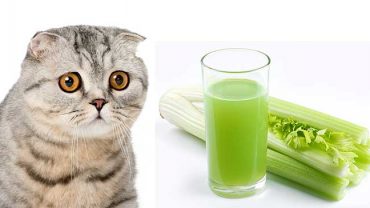As a cat owner there is always an excuse to give your friend a little something special. After all, a little treat now and then isn’t going to hurt, right?
Cats can be picky eaters though, like any pet, and you always have to keep an eye open about what you give them.
The wrong treat can send your furry friend on a trip to the vet and leave you with a slightly lighter pocket. But worst of all, some foods are toxic to cats and can even result in life-threatening reactions.
As a cat lover you have to be vigilant to make sure that your cat is eating the right stuff and in a safe amount.
Even normally healthy foods for humans should be given in moderation and with consideration to cat biology.
So where does celery factor into this equation? Is it safe to give your cat celery? Let’s have a look at the facts.
Table of Contents
The Facts – Is Celery a Safe Choice For Cats?
Though it is important to remember that cats are carnivores and fruits/vegetables should only make up around 5% of their total dietary intake.
This makes celery a good and healthy treat every now and then, but you should not supplement a cat’s normal diet with any fruit or vegetable. That being said however, celery provides a number of benefits to your cat’s digestive health as you will read later.
That being said, reactions may vary from cat to cat. Some might not even look at the celery let alone eat it. Others might even play with the celery, rather than actually enjoy taking bites for nutrition purposes.
Never force your cat to consume vegetables if they are not interested. Remember, cats are carnivores which means that typically speaking vegetables aren’t on their normal diet.
But What About Celery Leaves For Cat?
Just like with the stalks, leaves are perfectly fine for your cat to consume. They may even react to the leaf as though it were catnip.
Kittens especially are prone to get hyperactive after consuming celery leaves. While this may be bizarre for you to watch, it is not uncommon for cats and kittens especially to have a fascination with these leaves.
If you see your cat rolling around like a kitten fresh to the world in celery, don’t be alarmed.
Can Cats Drink Celery Juice?
Now this is a juicy subject! Celery juice is safe for your cat to consume, however, you do have to take concentration into consideration.
Juices tend to be far more concentrated than the actual vegetable, and as a result you should only ever give your cat very small amounts of celery juice.
If you are considering this method, you should only give your cat small amounts to start out. Try to see and figure out what their tolerance is and keep an eye and ear open for any reactions or side effects.
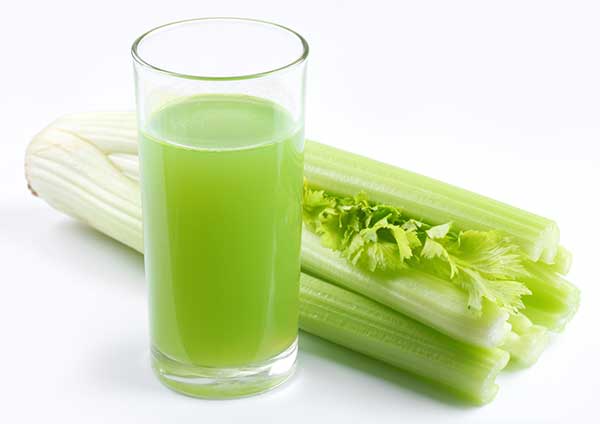
What Are the Health Benefits of Giving Your Cat Celery?
Good For The Stomach!
Just like with humans, celery promotes digestive health in most animals including cats. This is because of the high amount of phytonutrients found in even a single stalk of celery.
Phytonutrients are chemicals produced by plants often to give them protection from predation or from other environmental damage.
These phytonutrients actually are healthy for some animals and promote digestive health. They are especially known for their anti-inflammatory properties, which can reduce inflammation in the digestive tract.
Celery stalk has approximately 25 different types of anti-inflammatory compounds which can promote both a healthy digestive tract and help to prevent other diseases such as arthritis or other inflammatory conditions within organs.
This paired with the large amount of antioxidants makes celery a good choice for digestive health and general health.
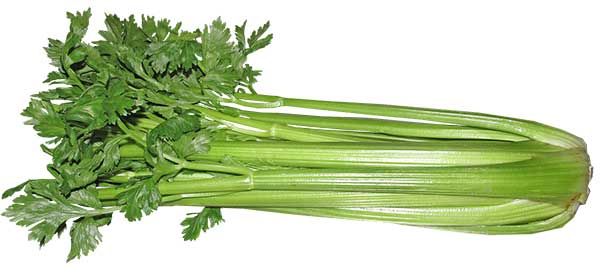
Antioxidants are chemical compounds found in foods and other substances that help prevent oxidative damage from free radicals.
Taking a trip back to chemistry class, free radicals are particles that have an unpaired electron. This causes the free radical to be, well, radical! Often unstable, free radicals in larger quantities can cause damage to cells and DNA.
Generally speaking, antioxidants protect organs which include digestive organs from oxidative damage. Celery packs a whopping 15 types of antioxidants which help protect the body.
But perhaps most important for your cat is the presence of pectin-based polysaccharides which have been shown to promote stomach health particularly.
These chemicals help to protect the stomach from ulcers by promoting the digestive lining of the stomach. This allows your cat to have a healthier digestive system as a whole.
Additionally, the high fiber and water content of celery promotes a healthier digestive system.
How Much Celery Can a Cat Eat?
Unlike humans, cats don’t need 2000 calories a day. They typically only need around 200, which isn’t all too much when compared to the human diet.
Thankfully, celery isn’t very high in calories, with a single stalk only being around 10 calorie units. This means that unless you’re planning to give your cat 20+ sticks of celery, you probably aren’t going to push that limit.
That being said, do always take into consideration the calories of other meals or treats you might be giving your furry little friend. Because while 10 calories may not be a lot, that’s 1/20th of a cat’s recommended diet.
The Side Effects
As mentioned before celery should be given to your cat only in moderation and it should not be used to supplement medically prescribed care or a medically prescribed diet.
? If you give your fluffy friend too much celery they might wind up with a stomach ache. Additionally, cats coming into contact with celery leaves can sometimes have skin agitation.
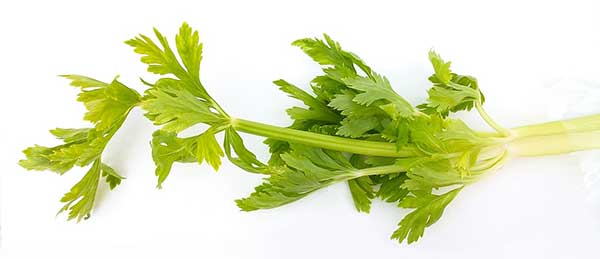
Although results may vary among cats, if your cat consumes too much celery they may experience the following.
- Upset Stomach
- Vomiting
- Diarrhea
- Food-Borne Illnesses
The extent of the side effects vary among different cats, the amount of celery consumed, tolerance to celery, metabolism and age.
These side effects can sometimes be hard to distinguish from food allergies as you will read later on, so it is important to keep a close eye on your pet and to react accordingly. Probiotics might be useful if your cat experiences any side effects from celery.
Kittens vs Cats
Kittens and full grown cats may react differently to celery. This is because a kitten is younger and usually smaller than a full-grown cat.
Because of this they are more likely to experience side effects and should be fed significantly less celery than you would an adult counterpart.
Though rare, they are also at heightened risk for food-borne illnesses that may exist on the surface of celery. Always clean your vegetables before feeding them to your pets.
Can Cats be Allergic To Celery?
Just like humans, cats can have food allergies and it is important to always consult a medical professional if you suspect that your cat has such an allergy or if you are already aware of an allergy existing.
Although environmental allergies are far more common than food-based allergies for cats, they do still exist.
It can be difficult to diagnose a cat with a food-based allergy however due to the lack of quick diagnostic testing.
Furthermore, a lot of the symptoms of food allergies tend to be similar to those found in cats over-consuming specific normally healthy foods.
Even with celery, a lot of the symptoms as you will see are rather similar to the previously mentioned side effects of cats eating too much celery.
Keep an eye and ear open for the following symptoms if you suspect that your cat might be having an allergic reaction.
- Sneezing, coughing, wheezing.
- Runny Nose
- Diarrhea
- Upset Stomach
- Skin Irritation
- Rash
- External and internal inflammation.
- Swelling around paws or other extremities.
If you suspect that your cat is having an allergic reaction to celery or any other food product you should immediately consult a vet professional. Reactions can vary from mild to lethal thus it is very important to keep a close eye for allergies.
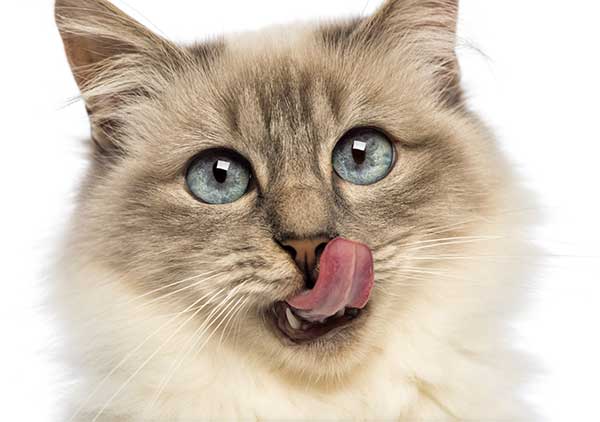
How Do Cats Get Allergies?
Allergies are the result of the immune system targeting consumed compounds or other compounds in the environment.
The body mistakes food or other substances as a viral, bacterial, or chemical attacker which results in the reactions that you can observe.
Contrary to popular belief, people and animals in general are not born with allergies. Rather allergies form later in life when the immune system comes into contact with potential allergens.
As a result, you have to always keep a close eye on how your pet is reacting to foods. Even foods that they have previously consumed safely in the past can become allergens in the future. This means that while they may not have a celery allergy, they could get one later in life.
Conclusion
Your cat however may or may not be interested in celery however, due to them being a carnivore. But there is nothing wrong with treating your furry little friend to a stalk of celery every once in a while if they do enjoy it.
Just make sure to only give it in moderation and to always consult a professional before putting your fluffy friends on any major dietary change.

